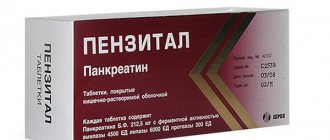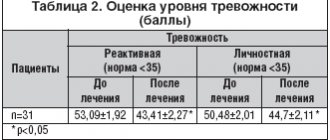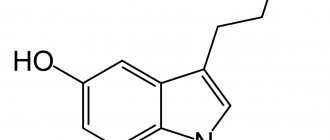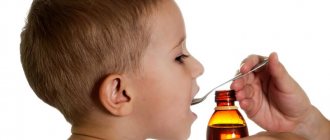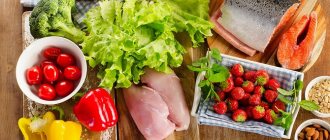Who is this diet suitable for?
We swallow pills and tubes, take tests - everything in order to leave this feeling behind, and it works. But if in all this “entertainment” you forget about the diet, you can’t count on a quick recovery of the body; it will harbor a serious, weighty grudge against you.
This is exactly the diet we will talk about today.
Most often, a diet is prescribed in these cases:
- Acute intestinal diseases during the period of recovery and restoration of the body.
- As a soft transition from a strict therapeutic diet to a general one.
- Chronic intestinal diseases (in remission).
- The combination of the above diseases with lesions of other organs: stomach, pancreas, liver and bile ducts.
The most important
In case of serious intestinal diseases, the absorption of nutrients is very difficult, so the diet should be as balanced as possible and sufficiently high in calories.
But at the same time, you will have to exclude foods that can increase the load on the digestive organs and provoke an increase in the disease. Diet No. 4 is also a good way to regain the weight lost during illness. Tags:
- Diets
- Diet
- Intestines
- Therapeutic diets
4 comments • To leave a comment you must be an authorized user
- SonyaGolden Very useful article! I know about Nutrilight, it’s a really cool working probiotic and, by the way, it’s very easy to use... I once treated my intestines with it after a long period of taking antibiotics, now sometimes I drink it for prevention and of course it’s a must for my diet)
- SvetaEsenina I suffered from constipation for a long time... I was on various diets, including in my diet the maximum amount of foods that improve microflora. In the end, the result was so insignificant! If the functioning of the gastrointestinal tract has improved, it is only a little bit. The main problem has not gone away... That's why I added the Nutrilight probiotic and what can I say... I was not mistaken here! 3 weeks and the microflora is completely restored! Now I drink it purely for prevention... and the result is that all that remains from the past problem are memories))
- Angelokk Cool tips. I also sometimes suffer from constipation, mainly if I go on a business trip or go on a diet, my diet changes. Fitomucil norm helps very well, a natural preparation based on fiber, stimulates the intestinal walls and improves its motility, and plum pulp softens stool. Allowed for pregnant and lactating women, this is also important during this period; for many, constipation is a common thing.
- sasha_alexandra I used to suffer from intestinal problems, it all started after taking antibiotics for a long time. The microflora suffered, but I only found out that this was not the case right away. I also tried to eat healthy, mainly the above-mentioned foods. But only after a course of Evalar’s multiflora completely resolved the issue with the intestines. In short, it couldn’t have happened without support from the pharmacy.
Composition and value of the diet
What is important in the process of diet therapy? Of course, the chemical composition - after all, it must be complete to support the body during a difficult period.
Our diet undoubtedly meets these requirements:
- the daily protein intake is 85-90 g,
- fat – 70-80 g,
- carbohydrates – 350 g.
Calorie content: the daily energy value of your menu will now be 2200-2500 kcal.
Diets for the gastrointestinal tract require limiting the amount of table salt in the diet to 10 g of salt per day, and here the rule “The less is better” works in full force.
On a note
An important point: do not forget about water - drinking balance is extremely important for the recovery of the body, but it is better to find out your personal dose from your doctor.
Reviews and results
Nutrition for diseases of the gastrointestinal tract during periods of mild exacerbation or in remission is quite varied. Most diets for gastroenterological patients contain the physiological norm of all substances, and are therefore suitable for constant use.
Physiologically inferior diets are used for a short period of time and only in case of a sharp exacerbation. Proper nutrition, according to patients, is an important component of treatment and quickly brings relief. If you adhere to it constantly, even not very strictly, then exacerbations can be avoided.
- “... I was told that if you burp rotten eggs, you need to check your stomach, although there were no other complaints. Gastroscopy revealed inflammation in the outlet section of the stomach. I checked the acidity - it turned out to be slightly low. After the prescribed treatment and diet, everything returned to normal within a month. I mastered all the dietary dishes and came to the conclusion that it is convenient to cook everything in a slow cooker. Now I understand that I ate incorrectly: I ate a lot of fried, spicy, smoked, and often only sandwiches. Now I’m trying to restore my stomach with proper and regular nutrition. I take porridge, boiled chicken or cottage cheese to work”;
- “... I have been suffering from gastritis for many years, and in recent years I have developed pain in the intestines and bloating. Outside of an exacerbation, I do not adhere to a diet and only during an exacerbation do I switch to preparing light soups, steamed cutlets, and casseroles with cottage cheese. I cook many dishes in a double boiler, but I think I need to buy a multicooker, since you can cook many more dishes in it. I can eat this way for about a month, and then I switch to general nutrition. I must say that after a week of proper nutrition, improvements come.”
The importance of protein in gastrointestinal diseases
A weak body copes worse with “collecting” proteins from the diet, so it may lack this essential element.
Patients with gastrointestinal diseases are advised to pay attention to getting enough protein. In this case, dry protein mixtures help.
Diso Nutrimun is an easily digestible protein that can easily fit into the menu, will help damaged tissues and organs recover and will not force you to “get” the required amount of protein from foods that are not part of the diet.
The purpose of the diet for diseases of the gastrointestinal tract
Adequate nutrition is what this diet primarily brings “to the world.” It helps the body to be in good shape and fight off the weakening attacks of the disease.
Since the diet is often called “transitional”, it should not be as soft and gentle as others. Therefore, it only moderately, but limits irritants of the mucous membrane and receptor apparatus. At the same time, she stands guard and excludes everything that can cause fermentation, or even rotting (and this happens!) in the intestines; does not allow the appearance in the diet of foods that activate bile secretion and the secretory function of the stomach, pancreas and bladder.
On a note
Diets designed to spare vulnerable parts of the gastrointestinal tract resist the presence of hard connective tissue in dishes, which is inherent in products of animal origin.
It is these indigestible parts that linger in the intestines as unwanted guests - and cause rotting processes in the large intestine. You won’t get out of the disease with such introductory notes, no matter how hard you try. And such diets insist on introducing the required amount of protein into the diet - and here we have no exceptions either. Let us explain: proteins are absorbed in our body a little earlier, still in the small intestine, and do not reach the “center” of the disease. But they help the body “climb out” faster.
This is why dry mixtures such as Nutrimun become literally irreplaceable - because they are really easy to digest in the stomach - unlike meat dishes that are difficult to digest. But we are not only “on a diet,” but we also protect the digestive organs from unnecessary stress.
Diet to prevent constipation
This type of diet is recommended when chronic constipation has functional causes, that is, serious diseases of the colon are excluded.
The diet should contain a lot of dietary fiber, fiber (up to 40 g per day), and this is 600-800 g of green vegetables, fruits, whole grains, seeds, legumes, seaweed, both fresh and cooked (steamed, stewed, baked, in the form of purees, porridge, smoothies). It is also important to take enough fluid - 30-40 ml per kg. weight. It is recommended to add unrefined vegetable oils to dishes with each meal (olive, sunflower, sesame, etc.), unless there are contraindications.
To receive adequate recommendations and develop an individual nutrition plan taking into account your diseases, eating habits and preferences, you can contact a gastroenterologist-nutritionist at the New Hospital.
About cooking
Once again, the chopped and pureed form of food is everything to us, but only when it is boiled, steamed or baked without a crust . But if you are desperately hungry for a piece of tasty meat (or even a piece of something that is not pureed), consult your doctor. Sometimes, if the specialist is confident that you can digest these innovations, he will allow you to prepare a small piece of food with a delicate consistency. But, of course, it will also need to be thoroughly boiled or stewed.
Diet and serving of dishes for gastrointestinal diseases
The diet obliges you to eat often, but little by little, so as not to force your stomach to do too much work and digest impressive portions of something tasty.
You need to eat 5-6 times a day—yes, that often—and the gastrointestinal tract will be sincerely grateful to you.
- Serve hot food very carefully: the temperature of such a dish should not exceed 60°C.
- The situation with cold dishes is similar: no lower than 15°C.
Otherwise, there is always a risk of injuring the already weakened organs of the gastrointestinal tract.
Basic Rules
The main goal of a diet for gastritis is to adhere to a diet that ensures normal digestion. The treatment table for gastritis (per day) should contain:
- 90-100 gr. protein (and 60% are animals),
- 50-80 gr. fat (75% animal)
- 300-320 gr. carbohydrates.
Nutrition rules for gastritis:
- Knowing the measure. With gastritis, the saying “after eating there should be a feeling of slight hunger” is more relevant than ever. Firstly, the feeling of fullness occurs only 10-15 minutes after eating, and, secondly, a full stomach does not cope well with its functions, especially with gastritis.
- Diet. Firstly, you should follow a meal schedule (at the same time). Secondly, with gastritis, meals should be fractional, 4-5 times a day, but at the same time it is necessary to avoid snacks (they provoke “excess” secretion of gastric juice and reduce its production during breakfast/lunch/dinner, which disrupts processes of processing and assimilation of food). Reading while eating, watching TV and “eating while running” should be strictly excluded.
- Rest after eating. After each meal, you need to rest for 15-20 minutes (not necessarily sleep). You can read a book or listen to music.
- Chewing food. Chewing food for a long time (at least 25-30 seconds for each piece) promotes more thorough mechanical processing of food, which makes it easier for a sore stomach. In addition, hunger in this case is satisfied faster (which prevents overeating). Refusal of complex dishes
The total energy value should be 2200-2800 kcal.
What can you eat if you have acute diseases of the gastrointestinal tract?
List of allowed products for gastrointestinal diseases:
- Bread : protein-wheat
, wheat loaf, dried (yesterday's) - biscuit dry cookies or buns (not buttery), pies with potatoes, apples, or cheesecakes.
- Milk: see if your stomach tolerates it well. The same applies to fermented milk drinks and curd dishes: souffles, puddings or “balls”.
- Eggs: up to 1 pc. in a day.
- Fats: If your doctor approves the introduction of butter into your diet, great! As part of this diet, you can put 10 g of butter in your favorite dish or just eat a sandwich in the morning. Frying food in butter is strictly prohibited.
- “First” courses: puree soup, which can be prepared with water or a very weak and always low-fat broth. Chop the permitted vegetables into smaller pieces, add a little rice, buckwheat, oatmeal or small pasta like “stars” to the saucepan - tasty and nutritious.
- Meat and poultry: lean varieties and cooked in minced form. Cutlets or meatballs, soufflés or quenelles, rolls made from lean parts of beef, veal, rabbit or chicken - all this can become the highlight of even a festive dinner.
- Fish: cook chopped, make juicy meatballs, cutlets or meatballs. But it is not forbidden to cook it in pieces, but you need to choose a low-fat type: hake, pollock, pike, cod, haddock or ice fish.
- vegetable diet with potatoes, pumpkin, zucchini and carrots, pre-boiled and thoroughly pureed.
- Cereals, pasta. Avoid barley and millet, which still remain an unbearable burden for an irritated stomach. Any porridge should be boiled in water, or better yet, boiled to a viscous, tender mass, but not hard.
- Fruits and berries: choose only very sweet and certainly soft ones, without hard skin, make sure that they are ripe without any “buts”. Plums, melons and apricots should be avoided. Tasty tip: baked apple mousse is a great snack during this diet.
- Drinks: prepare fruit jelly or make compote from pureed sweet fruits and berries, you can steam rose hips or drink natural tea, for example, black tea with milk (unless your doctor has forbidden you milk).
- Sauces, spices: aromatic dill and parsley (greens need to be chopped), laurel. You can also prepare the most delicate sauces: sour cream or milk, they will add a new note to even a boring dish.
Menu options
Option #1
Breakfast: steam omelette, herbal tea
Snack: baked apple
Lunch: cauliflower soup with croutons, fish cakes and mashed potatoes.
Afternoon snack: cottage cheese cake
Dinner: vegetable puree and boiled chicken breast, boiled beet salad with prunes
Option No. 2
Article on the topic
What types of therapeutic diets are there Breakfast: lazy dumplings with low-fat sour cream and strawberry syrup, weak tea
Snack: a bunch of white grapes
Lunch: white bean, carrot and spinach soup, baked beef with pumpkin slices, jelly
Afternoon snack: semolina casserole with pear
Dinner: rice zrazy with chopped lean beef, stewed zucchini
Option #3
Breakfast: semolina porridge with milk with berry jam, weak tea
Snack: banana and peach
Lunch: milk soup with baked pumpkin, buckwheat porridge with stewed carrots and steamed meatballs
Afternoon snack: baked apple
Dinner: vermicelli casserole with cottage cheese
What is not allowed for acute diseases of the gastrointestinal tract?
List of prohibited foods for gastrointestinal diseases:
- Spicy and salty;
- canned food;
- discard spices;
- radish, rutabaga, all types of cabbage, onions and beets, garlic, sorrel, turnips, radishes and some others. (Raw vegetables are not recommended. Vegetables containing coarse fiber are prohibited even when boiled. Therefore, they are excluded);
- whole grain and rye bread;
- mushrooms and any legumes;
- fatty meat, fish and poultry Pork lard and lamb fat;
- fried foods;
- all melons, plums, peaches and apricots, kiwis and pears. Fruits and berries with hard and dense skin.
- carbonated drinks;
Fully or partially limited products
All dietary tables exclude:
- Stringy and fatty meat (only lean and rare pork is allowed), fried meat and fish, fried potatoes, pancakes, pancakes, fried donuts, smoked meats, lard, goose, duck and lamb, smoked meats.
- Salted, fried, smoked fish, canned fish.
- Fast food and semi-finished products.
- Soups with fried dressing, onion soup, bean, pea, first courses with the addition of kidneys, millet and cabbage (this also applies to Savoy cabbage), cabbage soup, okroshka, solyanka, rassolnik, any soups with meat/fish/mushroom broths.
- Onion, meat, mushroom, fish, garlic, any mayonnaise-based sauces.
- Vegetables with coarse fiber (radish, radish), difficult to digest (mushrooms), irritating the mucous membrane (garlic, green onions, ginger, pickled vegetables), spinach and sorrel.
- Wheat, pearl barley, barley, millet and corn porridge, legume dishes.
- Ice cream, full-fat puddings, nut and raisin casseroles, nut muffins, chocolate.
- Fatty and sour cottage cheese, fatty fermented milk drinks, fatty cheese.
- Strong coffee and cocoa, fruit sparkling waters, alcoholic drinks.
- Black and other types of pepper, mustard, vinegar, horseradish.
- Pears, lingonberries, raspberries, blueberries, grapes, figs, nuts, currant compotes.
Table of prohibited products
| Proteins, g | Fats, g | Carbohydrates, g | Calories, kcal | |
Vegetables and greens | ||||
| vegetables legumes | 9,1 | 1,6 | 27,0 | 168 |
| swede | 1,2 | 0,1 | 7,7 | 37 |
| cabbage | 1,8 | 0,1 | 4,7 | 27 |
| cucumbers | 0,8 | 0,1 | 2,8 | 15 |
| parsnip | 1,4 | 0,5 | 9,2 | 47 |
| parsley (root) | 1,5 | 0,6 | 10,1 | 49 |
| white radish | 1,4 | 0,0 | 4,1 | 21 |
| turnip | 1,5 | 0,1 | 6,2 | 30 |
| celery | 0,9 | 0,1 | 2,1 | 12 |
| green beans | 2,8 | 0,4 | 8,4 | 47 |
| horseradish | 3,2 | 0,4 | 10,5 | 56 |
| garlic | 6,5 | 0,5 | 29,9 | 143 |
| spinach | 2,9 | 0,3 | 2,0 | 22 |
| sorrel | 1,5 | 0,3 | 2,9 | 19 |
Fruits | ||||
| bananas | 1,5 | 0,2 | 21,8 | 95 |
| melon | 0,6 | 0,3 | 7,4 | 33 |
Berries | ||||
| grape | 0,6 | 0,2 | 16,8 | 65 |
Cereals and porridges | ||||
| corn grits | 8,3 | 1,2 | 75,0 | 337 |
| pearl barley | 9,3 | 1,1 | 73,7 | 320 |
| Wheat groats | 11,5 | 1,3 | 62,0 | 316 |
| millet cereal | 11,5 | 3,3 | 69,3 | 348 |
| barley grits | 10,4 | 1,3 | 66,3 | 324 |
Bakery products | ||||
| vysivkovy bread | 9,0 | 2,2 | 36,0 | 217 |
| Old Russian grain bread | 9,6 | 2,7 | 47,1 | 252 |
| Rye bread | 6,6 | 1,2 | 34,2 | 165 |
Confectionery | ||||
| candies | 4,3 | 19,8 | 67,5 | 453 |
| cookie | 7,5 | 11,8 | 74,9 | 417 |
| butter cookies | 10,4 | 5,2 | 76,8 | 458 |
Ice cream | ||||
| ice cream | 3,7 | 6,9 | 22,1 | 189 |
Cakes | ||||
| cake | 4,4 | 23,4 | 45,2 | 407 |
Raw materials and seasonings | ||||
| seasonings | 7,0 | 1,9 | 26,0 | 149 |
| mustard | 5,7 | 6,4 | 22,0 | 162 |
Meat products | ||||
| pork | 16,0 | 21,6 | 0,0 | 259 |
Sausages | ||||
| dry-cured sausage | 24,1 | 38,3 | 1,0 | 455 |
Bird | ||||
| duck | 16,5 | 61,2 | 0,0 | 346 |
| goose | 16,1 | 33,3 | 0,0 | 364 |
Fish and seafood | ||||
| dried fish | 17,5 | 4,6 | 0,0 | 139 |
| smoked fish | 26,8 | 9,9 | 0,0 | 196 |
| canned fish | 17,5 | 2,0 | 0,0 | 88 |
Oils and fats | ||||
| animal fat | 0,0 | 99,7 | 0,0 | 897 |
| cooking fat | 0,0 | 99,7 | 0,0 | 897 |
Non-alcoholic drinks | ||||
| bread kvass | 0,2 | 0,0 | 5,2 | 27 |
Juices and compotes | ||||
| Orange juice | 0,9 | 0,2 | 8,1 | 36 |
| grape juice | 0,3 | 0,0 | 14,0 | 54 |
| Cherry juice | 0,7 | 0,0 | 10,2 | 47 |
| Strawberry juice | 0,6 | 0,4 | 7,0 | 31 |
| tangerine juice | 0,8 | 0,3 | 8,1 | 36 |
| tomato juice | 1,1 | 0,2 | 3,8 | 21 |
| * data is per 100 g of product | ||||

